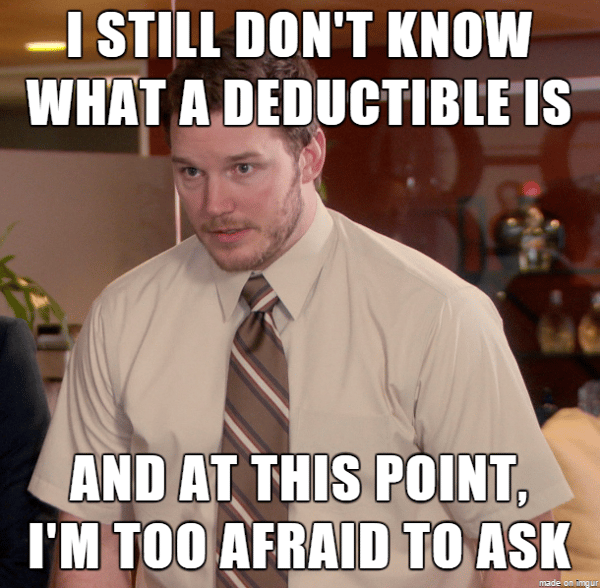
Before becoming an insurance professional, I never understood deductibles. To be honest, insurance always confused me and I could not make heads or tails of it.
As an insurance professional, I now understand how health insurance works and I run in to clients daily that are in the same boat I was in a few years back. Today, I am able to explain insurance whether it be life, health, or retirement products.
So... what are deductibles and how do they work?
In an insurance policy, the deductible is the amount of paid out of pocket by the policy holder before an insurance provider will pay any expenses. To put it simply, this is the amount you, as the consumer, must pay before you insurance coverage will pay anything on your medical, prescription, dental, vision, or hearing expenses.
If you are on Medicare and you have a Medicare Supplement Plan F, you do not have a deductible because plan F covers everything for the premium you are paying. If you have a supplement Plan G, you are responsible for the Part B deductible of $226.00 but your premiums are a lot cheaper than the Plan F. So, which is better - Plan F or Plan G? It has been determined that with the lower cost of Plan G and the consumer being responsible for the Part B premium of $226 (in 2023 - number subject to change each year), you save money.
FOR EXAMPLE:
| Medicare Supplement Plan F | You Pay | Medicare Supplement Plan G | You Pay |
|---|---|---|---|
| Montly Premium | $198.70 | Montly Premium | $132.96 |
| Part B Deductible | $0 | Part B Deductible | $226.00 |
| Total Yearly Cost | $2,384.40 | Total Yearly Cost | $1,821.52 |
Based on the information above, which looks better to you? Would you rather be paying out $2,384.40 per year or paying out $1,821.52 per year? Please note, these numbers do not include your Prescription Drug coverage Part D, Dental, Hearing, or Vision coverage.
Now, if you are on Medicare and you have a Medicare Advantage Plan, you may or may not have a small deductible but you definitely have a Max Out-Of-Pocket. You also may or may not have a small premium. Your plan will offer additional benefits which may include Prescription Drug coverage Part D, Dental, Vision, Hearing, some over-the-counter benefit, a gym membership, a personal emergency response system, healthy groceries, a flex account for utility expenses, or even a flex account that can be used for additional Dental, Vision, or Hearing coverage.
When you decide on your coverage options, it is a good idea to look at all options and decide which one is best for you. As insurance professionals, we can not tell you which plan you should choose, we can only review all plans with you, show you the best options that are based off your personal situation, and recommend products.
If you should have any questions or need assistance looking to see which option is right for you, feel free to contact me or reach out to your local advisor that you have been working with for years to determine which option may be right for you. My contact info can be found on the contact tab at the top of this page.
I hope you have enjoyed this blog and found some great information to think about.
God Bless!!!


Create Your Own Website With Webador